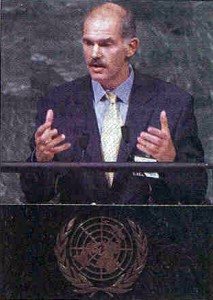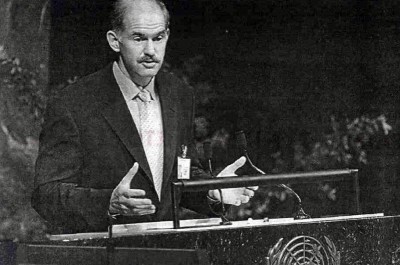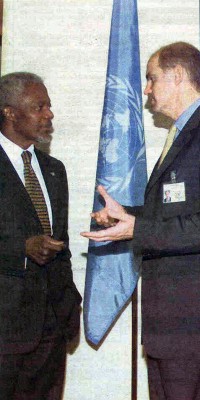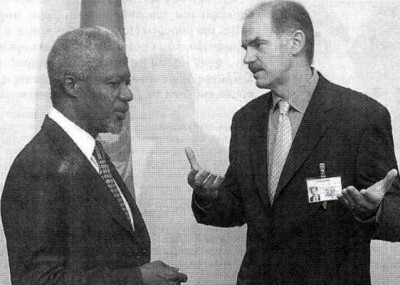

New York 22 September 1999
Mr President,
I would like to express my most sincere congratulations on your election to the Presidency of this Session of the General Assembly. It is significant that your country, which gained independence as a result of the struggle of its people and the successful efforts of this organization, will be presiding today over this Assembly and will, I am certain, bring its work to a successful conclusion.
I extend my congratulations to your predecessor for the commitment with which he conducted his duties.
I wish to express our warmest support to the Secretary General, Mr. Kofi Annan, for his tireless efforts. He has used his competent political skill, his moral authority and his deep knowledge of the opportunities and limitations of his office to pursue daunting tasks, often working against all odds,
My Government fully subscribes to the statement delivered by Mrs. Halonen, the Foreign Minister of Finland, on behalf of the European Union and also subscribes to the Memorandum by the Union.
Mr. President,
Globalisation in the field of information, ideas, the economy, democracy, and human rights, has been the dominant feature of the last years of our century. Some people fear it, some try to ignore it, a few try to fight it, others to avoid it. Many welcome it as a creative challenge. We Greeks are amongst the latter category. We thrive on openness, freedom of exchange, freedom of thought, of expression and of inquiry. We speak the language of dialogue, the language of Ideas. This is our tradition.
We are proud of this tradition that sparked off the Renaissance and supported the Enlightenment, whose essence was captured by Immanuel Kant's motto: 'sapere aude' -dare to think. Globalisation challenges us to dare think the unthinkable in terms of sovereignty, international relations and human rights. But this is not enough. We know we must go beyond. We must dare to state a vision for our world.
Mr President, we must dare to hope:
We take heart that at the end of our century, democracy is celebrated as the universal System of political rule, the only secure basis of legitimacy in the modem world. Experience teaches us that democracy does not only institutionalise freedom but also brings prosperity. Celebrated economist Amartya Sen has conclusively proved that a democratic system of government is no obstacle to the creation of wealth. Development does not require an authoritarian ruler. 'No substantial famine has ever occurred', Sen observes, 'In any country with a democratic form of government and a relatively free press'.
We take heart from the tact that more states claim to be democratic now than ever before in human history; and we are firmly committed to seeing this trend expand. Slowly but surely we are observing the globalisation of democracy and we dare to hope.
Nevertheless, our challenges and political dilemmas are formidable:
We need to globalize peace. We watch in awe as Israelis and Palestinians shake hands once again. The peace might be local but our pride is international. Equally, when watching India and Pakistan we dare to hope for non-proliferation; we cringe as pictures of war come out of Africa. We cannot hope for peace and yet shut our eye to war.
We need to globalize human
rights, Do we apply the same standards everywhere, from Kosovo to Timor
to Cyprus to Rwanda?
We need to globalize our
concept of tights pertaining to human beings. We understand multinationals
who support human rights to protect their investments, but who will protect
individuals who seek protection for the indignities of the world market?
We have to globalize ethics. From Kosovo to East Timor we have bowed our heads for we are still ill equipped to deal with global ethical dilemmas. Can human suffering be subordinated to sovereignty? Can we afford to be inconsistent in the application of military intervention? Is it right to impose trade sanctions on governments that violate international rules, at the expense of their innocent populations?
We seek to globalize values. Technological innovation is calling into question some of our most deeply felt beliefs. From cloning to brain transplants, scientists now face dilemmas that have global implications. We must make sure that fear does not inhibit scientific development, and that curiosity does not inhibit civility.
We need to globalize wealth, The growing gap between rich and poor countries has marginalized a large segment of the world's population and led to dangerous social problems, from illegal immigration to drug trafficking, terrorism, child labor and sexual exploitation, in art effort to contribute what little we can Greece decided to increase its ODA by an annual average of 27% over a five-year plan.
How can we hope to face these challenges if the people of this world do not share a basic education and do not enjoy basic health? While electronic media have minimized the restrictions of borders fn the transfer of resources, wealth and information, democratic institutions and social policies remain confined within the borders of nations. We cannot wait for democracy to spread at this pace. We need a faster cure.
Mr. President,
Beyond the globalization of democracy, I call for the democratization of globalism. This is a vision worthy of these United Nations. We seek a United Nations that is an active center for peace and justice, a center for the improvement of the life of each individual on this earth. We expect a United Nations to respond to our needs for global ethics and global values. We believe in a strong United Nations that will act swiftly and effectively against those who wage war, harbor terrorism and destroy our planet. We aspire in a United Nations, which will become the center for democratic thinking and democratic practice throughout our world.
May these United Nations, on our behalf, develop a culture of dialogue and a dialogue of cultures.
For this is the essence of democratic politics. Not a clash of different civilizations but an educative dialogue that allows all to take part. We must educate each other to find peaceful and democratic ways to confront our new challenges.
This is a task for the United Nations. We yield to its authority as the only forum able to democratize globalization. We call for all member states to provide the United Nations with the authority and the means to perform its duties. Greece will. As our Ghanaian colleague said yesterday; we continue to ask more of the United Nations, and yet we continue to endow it with fewer resources. We feel that following the important reforms of the Secretariat, the time has come to expand this organization's authority, responsibility and budget. Do we dare allow this organization to hope? In Greece we do.
Mr. President,
My country believes in the strengthening of the United Nations, but it also believes in doing its own work on the ground - in the region. Uri Savir, the Israeli negotiator in Oslo, has said that ""Peacemaking is a gradual revolution that moves from hostility to a desired conciliation, a collection of moments in which a new trend is set in motion."
Together with the International Olympic Committee, Greece has proposed the creation of ‘a moment’ a global moment: We would like to see the revival of the ancient Greek tradition of Olympic Truce. We hope that this Assembly, which has unanimously endorsed this project, will give its full support to the observance of the Olympic Truce during the games of the year 2000 in Sydney, Australia, In Athens 2004 end all future Olympics. That this event may become a momentous festival of peace in our global village.
From Cyprus to Bosnia, "a collection of moments" is providing a ray of hops that, one day, a United Balkans and South Eastern Europe will belong to a united Europe. A family of nations, a bouquet of cultures, a kaleidoscope of ethnicities - where diversity is our strength - where borders, are so profoundly respected, they cease to exist. Can we dare see that far? Do we dare not to?
Mr. President, we dare to hope.
For Cyprus first: Following the Declaration on Cyprus of the leaders of the G-8 group and the UNSC Resolutions 1250 and 1251 of last June, there is hope that a new initiative may break the deadlock. As we envision a multicultural Balkans we are striving to see a Cyprus as a federal state with a single sovereignty, a single citizenship, a united, demilitarised, Independent country with its territorial integrity safe from encroachments and no foreign hoops on its soil. Cyprus' accession to the European Union - certainly benefit both communities living on the island. We invite the Turkish-Cypriots, in the spirit of a newfound friendship between Greeks and Turks to grab this historical opportunity. Let us break down the last 'Berlin Wall' that artificially divides these peoples. Let us show the world and our children, that - yes - we can live together in peace and harmony with respect to human rights and democratic principles within a wider European family,
Mr. President,
The tragic events in Kosovo shall be remembered by acts of brutal ethnic cleansing and a military intervention that ensued without the authorization of the Security Council. Today, I encounter individuals who, under pressure to ‘close the case’ of the Balkans, opt for redrawing maps in hope that ethnic isolation, by constructing new walls and barriers between our peoples of the region.
I assure this Assembly that there is no short path, no lazy road if you will, to lasting peace in the Balkans. Consistent with our policy in our region is our belief that borders are sacrosanct - but within them we must do our utmost to protect minorities, democratic procedures and human rights. We must strive to develop the three pillars of the Stability Pact for South Eastern Europe: Democracy, Security and Reconstruction,
We need to build democratic institutions, Judicial and financial systems, competitive business and free media communities, things we often take for granted.
We need to be aggressive in ensuring that all forms of likely threat to security within and among our countries are dealt with directly, openly and with vigour. The protection of minorities is of fundamental importance.
We need to provide basic economic help that will fight against the poverty and degradation that leads to ethnic and religious fanaticism.
But more importantly we need a Total Balkan Approach. When I say total I mean one coherent and consistent approach by the International community. The Balkans are badly served by mixed signals,
Greece has drawn for itself a creative and effective role in the region. Greece supports all efforts to deepen democracy in the region. A total Balkan approach to democracy, security and reconstruction will pave the way for our neighbors to enter the European Union. Yugoslavia is, of course, an integral part of this Total Balkan Approach. So too are Greece's bilateral and trilateral contacts of with Albania, the Former Yugoslav Republic of Macedonia, Bulgaria and Roumania.
We believe that in our region there are no good or bad people, just good and bad practices. We have delivered humanitarian assistance and peacekeeping forces, we have conducted multilateral diplomacy, and we have promoted every effort that adheres to principles stated above without discrimination. Yes, in the Total Balkan Approach there is room both for the Albanian and Serbian people. We ask them too to dare have a vision, the same vision: that one by one each Balkan country will become part of a united Europe.
Mr. President,
If the road to peace is indeed made up of "a collection of moments" then I also dare hope for our relations with Turkey. My Turkish counterpart, Ismael Cem, and I have been engaged in careful diplomacy far many months. We recently inaugurated discussion committees to address a number of bilateral concerns, including trade, tourism and the environment, where we feel our two countries have much to gain from mutual cooperation.
Peoples' aspirations for the principles of democracy, security and prosperity can overcome historical strife. In this democratic spirit, we believe that our security is bound by the stability In the region; that our neighbors' strength is our own strength.
From the outset, Greece shared with Turkey the vision that one day Turkey will become a worthy member of a United Europe. But we recognize today that our role needs to load the process.
The terrible earthquakes that shook both our countries have accelerated the process. Spontaneous and dramatic acts of fraternity and solidarity between our citizens short circuited elaborate diplomatic strategies, and exerted powerful pressure on our governments to move ahead boldly. I, for one, shall never forget the sweat, tears and the genuine expressions of solidarity and friendship shared by so many non-governmental organizations and particularly by members of the Greek and Turkish rescue workers (EMAK and AKUT), sifting over the rubble of buildings destroyed by the earthquakes. These people did not wait for us to act. Their actions globalize democracy.
Mr, President,
This is one more lesson for democracy. International relations, humanitarianism, peace and cooperation have much to gain if we allow for 'citizens diplomacy' and give our full support to constructive roles for non-governmental organisations in this world.
Building on this unique experience, in our first joint act as members of this organization, I join hands today with my Turkish counterpart Ismail Cem. I join hands with him to announce to the UN Assembly the establishment of a joint Stand-by Disaster Response Unit (SDRU) comprising of contingents drawn from governmental and non-governmental agencies of both countries to reinforce the UN capacity in this field.
A comprehensive and methodical approach to dealing with natural disasters concurs with the recent proclamation of the Secretary General, Mr. Kofi Annan: "Some major risk reduction and disaster prevention programs require levels of funding that many poor countries simply cannot afford."
Mr. President,
In this Assembly, great visions, founded on a strong sense of realism, have helped to make the world more democratic, safer, and a little less painful for those in need. In Greece and South East Europe, similar visions are helping to build democratic institutions, cement peace end pave the way to prosperity.
There simply is no truth in the saying that we in the Balkans are trapped, that we have produced more history than we can consume and that we are prisoners to past conflicts end hatreds. History is not duress unless one makes it so. The challenge to every new generation of Greeks, the challenge to our neighbours is to learn from our history - not become slaves to it. We are building a new vision for the region, slowly but surely.
We look forward to the day when Belgrade and Pristine will be an easy bus ride away, when Jerusalem and Damascus, Athena and Ankara and, of course, the two parts of divided Nicosia, will no longer be separated by fear and suspicion, but be joined in peace. Perhaps that day is still far away, but as a Chinese proverb has it: 'A Journey of a thousand miles begins with one small step'.
This step we dared take this year. We dared to imagine the world at the end of a thousand miles. Rigas Fereos, a prominent Greek revolutionary wrote in a constitution for the Balkans more than two centuries ago:
"All should be equal with equal rights without prejudice in the Balkans: Christian, Muslim and Jew, Albanian, Slav, Romanian, Bulgarian, Greek, Turk, Armenian, from Bosnia to Arabia".
Today, 100 days before the next millennium, we commit our selves to keep walking in this direction of a new hope and vision for our world.
Thank you, Mr. President
 |
 |
 |
 |